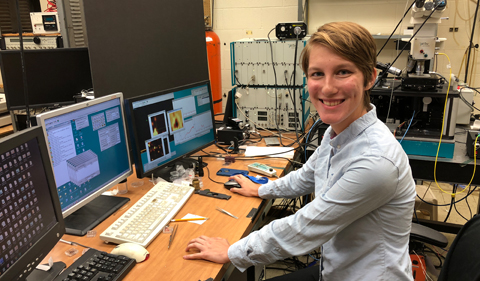By Kate Nichols
(B.S. Physics, College of Arts & Sciences, Class of 2020)
I conducted research with Dr. Martin Kordesch in Physics & Astronomy over the summer of 2018, where I used Raman Spectroscopy to study the reaction of different cathode fill materials (Ba, Sc, Al, and Ca oxides) as they were heated on a tungsten filament. My objective was to understand the chemistry of electron emitters in transmission tubes.
Before starting this project, I had no idea what Raman Spectroscopy was. After spending the summer studying it, I now know that it works by measuring the scattered light that occurs from the vibrations between atoms.
One skill that I definitely improved was my ability to problem solve. Often while conducting the research, things wouldn’t work out perfectly. When the data was clearly bad, I would have to work out how to improve the data collection process. It involved a lot of trial and error, to say the least.
A major challenge that I faced was the need for patience. Sometimes I would collect data for an entire week, just to find out that everything that I had collected wasn’t accurate, or that the machine wasn’t working properly. It was incredibly frustrating how many times I had to stop and figure out how to improve, or just stop altogether when the spectrometer was out of commission. When these things would happen, it was easy to become impatient. From Dr. Kordesch, I learned that patience is a virtue—especially in experimental research.
I believe it’s important to do this testing because just because something works doesn’t mean that it can’t be improved. The materials that I’m studying could be found to be more efficient than the fill materials currently being used in satellite communications. We also don’t know a lot about the reactions that occur during the heating process, so it’s also important (and interesting) to discover what’s going on inside these materials.




















Comments